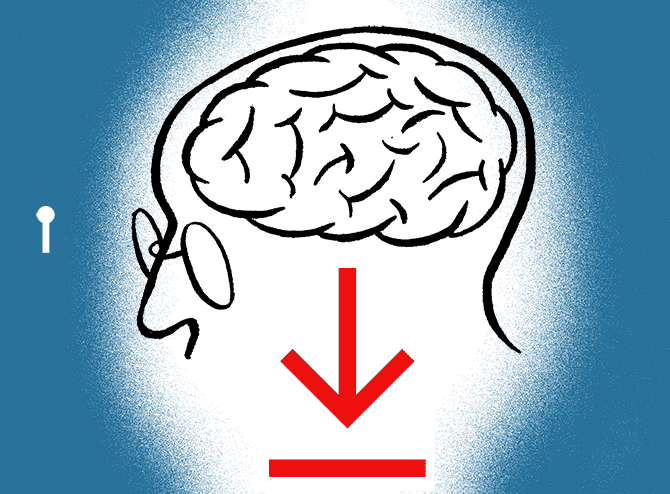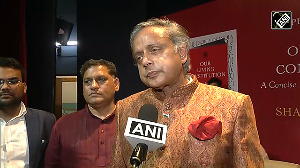The linking of biometric UID/Aadhaar number to all public services makes “We, the People of India” worse than slaves, says Dr Gopal Krishna.
The second in a 7-part series.
Illustration: Dominic Xavier/Rediff.com.

While adding some 24-page-long words of concurrence with the opinions of Justices Chelameswar, SA Bobde, Rohinton Fali Nariman and Dr DY Chandrachud in the verdict of August 24, 2017, on the right to privacy, Justice Abhay Manohar Sapre refers to 'We, the People of India' in the Preamble of the Constitution, to the “attack on the legality and correctness of Aadhar scheme” and to the “dignity of the individual”.
The original case pertains to the Central Identities Data Repository of Unique Identity/Aadhaar numbers of Indian residents.
The verdict came as a consequence of a reference made to the Constitution bench to decide the existence of right to privacy as a Fundamental Right.
Justice Sapre observed, “The most important place of pride was given to the People of India by using the expression, We, The People of India, in the beginning of the Preamble. The Constitution was accordingly adopted, enacted and then given to ourselves.”
His pointed reference to the presence of 'We, the People of India' assumed great significance if it is read with the definition of ‘resident’ in the Aadhaar (Targeted Delivery of Financial and Other Subsidies, Benefits and Services) Act, 2016.
As per Section 2 (v) "resident" means an individual who has resided in India for a period or periods amounting in all to 182 days or more in the 12 months immediately preceding the date of application for enrolment.
First in the series: Right to Privacy and the Bhagavad Gita
Notably, the National Identification Authority of India Bill, 2010, which was withdrawn from Rajya Sabha till March 3, 2016 for the introduction of Aadhaar Bill 2016 referred to “We, the People of India” as the ‘resident’ under Section 2(q) as an individual usually residing in a village, rural area, town, ward, demarcated area (demarcated by the Registrar General of Citizen Registration) within a ward in a town or urban area in India.
Interestingly, "We the People" is also the opening phrase of the preamble to the constitution of United States.
In fact this phrase finds place in the constitutions of some 50 countries.
It is “We, the People” who have constituted the Constitution of India.
It emanates from “We, the People” who are parochially being defined by Aadhaar Act as “residents”.
The conclusive assumption about “We” being the first brick of the basic structure cannot be tested or questioned in any court, but Aadhaar Act does the unthinkable by narrowcasting its meaning since September 12, 2016, when the act came into force after more than 100 crore Indians were coerced and enticed to enroll for Aadhaar numbers.
Based on an inquiry into the human condition, renowned psychiatrist Thomas Szasz wrote in The Second Sin that in the animal kingdom, the rule is, eat or be eaten; in the human kingdom, it is define or be defined.
It is clear that “We the People” are being defined in the bill as “residents” in a manner that makes our republic deficit in democracy for some visible and invisible purposes. The legitimacy of this exercise is the subject matter before the court.
The reference made by Justice Sapre to the “attack on legality and correctness of Aadhaar scheme” is reminiscent of the orders of the Punjab and Haryana high court.
In its order dated February 19, 2013, the bench of Chief Justice AK Sikri (currently judge of the Supreme Court), and Justice Rakesh Kumar Jain had noted that the petition against UID/Aadhaar “raises a pure question of law.”
Responding to the direction issued to the Union of India and Union territory of Chandigarh by the Punjab and Haryana high court in the matter of Civil Writ Petition 569 of 2013 filed in the high court against Union of India and others, the executive order for making Unique Identification/Aadhaar was withdrawn.
The HC order dated March 2, 2013, observes, “In this writ petition filed as a public interest litigation, the petitioner has challenged the vires of notification issued by the Union of India for making it compulsory to have UID cards.”
It further observed that “second issue raised in this petition is that vide order dated December 5, 2012, respondent No 3, ie, Deputy Commissioner, UT, Chandigarh has given directions to the Branch In charge Registration-cum-Accountant, office of Registering & Licensing Authority, Chandigarh not to accept any application for registration of vehicle and grant of learner/ regular driving license without UID card” referring to the UID/Aadhaar numbers.
The petition in the Punjab and Haryana high court included the following prayers:
i) Issue a writ in the nature of certiorari to quash executive order dated December 5, 2012, passed by respondent No.3 passed in violation of Motor Vehicles Act, 1988 and Central Motor Vehicle Rules, 1989 vide which UID has been mandatory for the registration of vehicles and grant of learner/ regular driving licence.
ii) A writ in the nature of mandamus directing the Union of India to accept other proofs of identity and address, ie, voter I-card issued by the Election Commission of India, the constitutional body and passport issued by the ministry of foreign affairs, the Government of India and other proofs of address, age prescribed under Rule 4 of Central Motor Vehicles Rules, 1989 for issuance of learning/ regular driving license and for registration of vehicle;
iii) Further it sought direction for the Union territory of Chandigarh and the Union of India not to make mandatory the UID for essential public utility services and accept other documents as proof of identity and address as per the Rules;
The writ petition had emphasised that during the pendency of the petition, executive order dated December 5, 2012, and other similar executive orders vide which UID/Aadhaar have been made compulsory for essential public utility services may kindly be stayed.
In its concluding paragraph the March 2, 2013, order of the high court reads, “Today, short affidavit of M Shayin, IAS, deputy commissioner, UT, Chandigarh is filed stating that the aforesaid instructions have been reviewed and now the insistence of UID card is no longer treated as mandatory.”
It noted in its order that since “this issue is pending before the Supreme Court” it chose not pass any observation on the remaining prayers.
It is evident from this outcome that the moment the court raised the “questions of law” in the matter of UID/Aadhaar scheme, the Union of India realised that its position was not legally defensible and it submitted that “the insistence of UID card is no longer treated as mandatory”.
This case demonstrates that UID/Aadhaar scheme is legally questionable.
Against such a judicial backdrop, Justice Sapre recollected the significance of the Preamble to the Constitution in the UID/Aadhaar case.
“Perusal of the words in the Preamble would go to show that every word used therein was cautiously chosen by the founding fathers and then these words were arranged and accordingly placed in a proper order. Every word incorporated in the Preamble has significance and proper meaning," observed Sapre.
He noted, “The incorporation of expression Dignity of the individual in the Preamble was aimed essentially to show explicit repudiation of what people of this country had inherited from the past.”
It is clearly a reference to the inhuman caste-related practices which undermined human dignity.
This observation is significant because UID/Aadhaar fixes caste identities through time even after people are dead.
The information held about caste will be fixed to people by the UID/Aadhaar number. Changing an identity will become impossible.
While there are efforts underway for the eradication of the practice of manual scavenging, for rehabilitation of those and then leaving behind the tag of manual scavenger, there can be no justification for making people accept a system that does not allow them to shed their identity and move on.
A number that links up databases of caste identity through convergence with existing databases cannot be good for “repudiation of what people of this country had inherited from the past”.
Jacob Appelbaum, computer security researcher, hacker, activist, and a spokesperson for WikiLeaks, has warned that biometric Aadhaar/UID will create a digital caste system.
He said, "Going by the way it is now being implemented, if you choose not to be part of the system, you will be the modern-day equivalent of an outcast. In theory, you are supposed to have the freedom to choose but in reality, the choice will only be whether to be left out and left behind".
The promoters of biometric UID/Aadhaar number are promoting digital and biometric caste system and digital and biometric racism.
Notably, Aadhaar Act, 2016 lists breaking into CIDR as an offence but this law criminalises a technological impossibility.
In a bizarre act, it provides that only Unique Identification Authority of India can file a complaint when the data of a resident of India is misused or abused, instead of the victim of abuse.
As per Section 47, “Courts will take cognizance of offences under this act only upon complaint being made by the UIDAI or any officer authorised by it.”
This deprives the victim of a right to file complaint and also undermines the dignity of the individuals although Section 34 of the act states that “Impersonating or attempting to impersonate another person by providing false demographic or biometric information will punishable by imprisonment of up to three years, and/or fine of up to ten thousand rupees.”
Victims cannot file complaint even when someone changes or attempts to change any demographic or biometric information of an Aadhaar number holder by impersonating another person (or attempting to do so), with the intent of i) causing harm or mischief to an Aadhaar number holder, or ii) appropriating the identity of an Aadhaar number holder although it is punishable under Section 35.
Victims of abuse cannot file complaint in cases wherein collection of identity information is done by one not authorised by this act, by way of pretending otherwise despite the fact that the act makes it punishable under Section 36.
Unless authorised by UIDAI or any officer authorised by it, victims cannot file complaint even when there is “Intentional disclosure or dissemination of identity information, to any person not authorised under this act, or in violation of any agreement entered into under this act” under Section 37 although it is punishable.
Unless authorised by the UIDAI -- the intentional acts like accessing or securing access to the CIDR; downloading, copying or extracting any data from the CIDR; introducing or causing any virus or other contaminant into the CIDR; damaging or causing damage to the data in the CIDR; disrupting or causing disruption to access to CIDR; causing denial of access to an authorised to the CIDR; revealing information in breach of (D) in Section 28, or Section 29; destruction, deletion or alteration of any files in the CIDR; stealing, destruction, concealment or alteration of any source code used by the UIDAI, will be punishable under Section 38 -- victims cannot file a complaint.
Section 39 of the act reads, “Tampering of data in the CIDR or removable storage medium, with the intention to modify or discover information relating to Aadhaar number holder will be punishable”. Thus, it admits that such acts are possible and imminent but the act does not empower the victims of such tampering or removal instead it empowers the UIDAI.
If these provisions made in Aadhaar Act are accepted as the law, the Fundamental Rights guaranteed under the Constitution of India and more particularly the right to liberty under Article 21 would be denuded of vigour and vitality.
It marks the beginning of the end of right to human dignity recognised and promised by the Constitution.
Citizens’ opposition to the CIDR of UID/Aadhaar numbers of Indian residents can be linked to more than a century old world famous Satyagraha of Mahatma Gandhi in order to oppose the identification scheme of the government in South Africa.
On August 22, 1906, the South African government published a draft Asiatic Law Amendment Ordinance. It required all Indians in the Transvaal region of South Africa, eight years and above, to report to, a certificate which would then have to be produced upon demand.
The move proposed stiff penalties, including deportation, for Indians who failed to comply with the terms of the ordinance.
Knowing the impact of the ordinance and effective criminalisation of the entire community, Mahatma Gandhi then decided to challenge as it undermined human dignity.
Calling the ordinance a 'Black Act' he mobilised around 3,000 Indians in Johannesburg who took an oath not to submit to a degrading and discriminatory piece of legislation.
The UID/Aadhaar case demonstrates how 'those who forget history are condemned to repeat it'.
The linking of biometric UID/Aadhaar number to all public services is making “We, the People of India” worse than slaves.
This amounts to normalisation of cruelty towards Indian residents, which creates a compelling logic for scrapping this biometric identification exercise.
Now that the Constitution bench has recognised the right to privacy, the original three-judge bench of the Supreme Court which is to pronounce its verdict on UID/Aadhaar should also ponder over following questions:
Will foreign companies like Ernst & Young, Safran, L1 Identities Solution and Accenture that admittedly work with United States security and intelligence agencies who were awarded contracts on July 30, 2010, for implementation of Aadhaar number protect US national interest or India's national interest in the aftermath of Patriot Act taking cognisance of disclosures by whistleblower Edward Snowden and Wikileaks?
The manifesto titled 2083: A European Declaration of Independence brought out by Norwegian gunman and neo-Crusader, Anders Behring Breivik who carried out the heinous attacks on his fellow citizens is actually a unique identity manifesto as well.
This manifesto refers to the word "identity" over 100 times, "unique" over 40 times and "identification" over 10 times. There is reference to "state-issued identity cards", "converts’ identity cards", "identification card", "fingerprints", "DNA" etc.
Is it not true that only a misanthrope can approve of it?
The deluge of advertising and public relations efforts by biometric identification and surveillance technology vendors have attempted to cloud the minds of judicial, political and media fraternity.
The dangers of trusting such technological advances for determining social policies will consequent in a situation where “[A] warrant requirement will not make much difference to a society that, under the sway of a naive and discredited theory of genetic determinism, is willing to lock people away on the basis of their genes” among other adverse effects. We submit that this entire issue is about denial of Fundamental Rights by the emergence of an unlimited government."
This constitutes an open declaration of war against citizens’ sensitive personal information like biometric data by transnational entities and governments captured by them paves way for the enslavement of present and future generations through biometric Aadhaar database that lies on cloud beyond Indian jurisdiction.
Can there be any legitimate constitutional or statutory authority which can be empowered to indiscriminately prepare a database based on biometric and electronic profiling of present and future generation of “We, the People of India” for all time to come? Will such Centralized Identities Data Repository safeguard, enhance or undermine the dignity of “We, the People”?
Such initiatives must be stopped and boycotted, else it will spread its tentacles in every sphere of life and mobility in the country before it is too late.
To be continued.
Part 3: Aadhaar is against Arthashastra, Hadith and Bible
Dr Gopal Krishna is a public policy and law researcher, convener, Citizens Forum for Civil Liberties and editor of www.toxicswatch.org
He had appeared before the Parliamentary Standing Committee on Finance that examined and trashed the Aadhaar Bill, 2010, which was reshaped and introduced in Rajya Sabha where it remained pending till March 3, 2016. It was then withdrawn and supposedly a new Bill was introduced as a Money Bill and got enacted act Aadhaar Act 2016 amidst vociferous objection by the Rajya Sabha. It faces a constitutional challenge before the Supreme Court's original three-judge bench.






